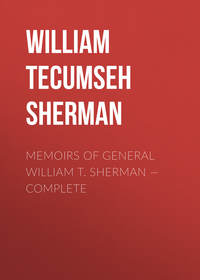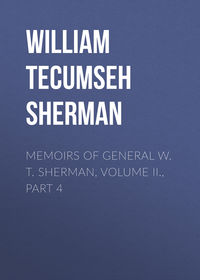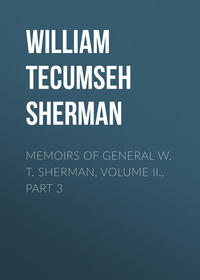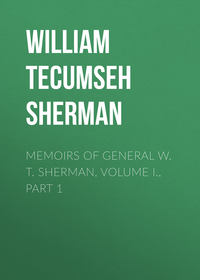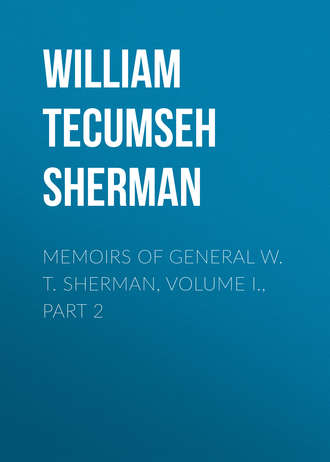 полная версия
полная версияMemoirs of General W. T. Sherman, Volume I., Part 2
Meantime, General Grant, at Jackson, had dispatched Brigadier-General McPherson, with a brigade, directly for Corinth, which reached General Rosecrans after the battle; and, in anticipation of his victory, had ordered him to pursue instantly, notifying him that he had ordered Ord's and Hurlbut's divisions rapidly across to Pocahontas, so as to strike the rebels in flank. On the morning of the 5th, General Ord reached the Hatchie River, at Davies bridge, with four thousand men; crossed over and encountered the retreating army, captured a battery and several hundred prisoners, dispersing the rebel advance, and forcing the main column to make a wide circuit by the south in order to cross the Hatchie River. Had General Rosecrans pursued promptly, and been on the heels of this mass of confused and routed men, Van Dorn's army would surely have been utterly ruined; as it was, Van Dom regained Holly Springs somewhat demoralized.
General Rosecrans did not begin his pursuit till the next morning, the 5th, and it was then too late. General Grant was again displeased with him, and never became fully reconciled. General Rosecrans was soon after relieved, and transferred to the Army of the Cumberland, in Tennessee, of which he afterward obtained the command, in place of General Buell, who was removed.
The effect of the battle of Corinth was very great. It was, indeed, a decisive blow to the Confederate cause in our quarter, and changed the whole aspect of affairs in West Tennessee. From the timid defensive we were at once enabled to assume the bold offensive. In Memphis I could see its effects upon the citizens, and they openly admitted that their cause had sustained a death-blow. But the rebel government was then at its maximum strength; Van Dorn was reenforced, and very soon Lieutenant-General J. C. Pemberton arrived and assumed the command, adopting for his line the Tallahatchie River, with an advance-guard along the Coldwater, and smaller detachments forward at Grand Junction and Hernando. General Grant, in like manner, was reenforced by new regiments.
Out of those which were assigned to Memphis, I organized two new brigades, and placed them under officers who had gained skill and experience during the previous campaign.
CHAPTER XII.
MEMPHIS TO ARKANSAS POST.
JULY, 1882 TO JANUARY, 1883
When we first entered Memphis, July 21,1862, I found the place dead; no business doing, the stores closed, churches, schools, and every thing shut up. The people were all more or less in sympathy with our enemies, and there was a strong prospect that the whole civil population would become a dead weight on our hands. Inasmuch as the Mississippi River was then in our possession northward, and steamboats were freely plying with passengers and freight, I caused all the stores to be opened, churches, schools, theatres, and places of amusement, to be reestablished, and very soon Memphis resumed its appearance of an active, busy, prosperous place. I also restored the mayor (whose name was Parks) and the city government to the performance of their public functions, and required them to maintain a good civil police.
Up to that date neither Congress nor the President had made any clear, well-defined rules touching the negro slaves, and the different generals had issued orders according to their own political sentiments. Both Generals Halleck and Grant regarded the slave as still a slave, only that the labor of the slave belonged to his owner, if faithful to the Union, or to the United States, if the master had taken up arms against the Government, or adhered to the fortunes of the rebellion. Therefore, in Memphis, we received all fugitives, put them to work on the fortifications, supplied them with food and clothing, and reserved the question of payment of wages for future decision. No force was allowed to be used to restore a fugitive slave to his master in any event; but if the master proved his loyalty, he was usually permitted to see his slave, and, if he could persuade him to return home, it was permitted. Cotton, also, was a fruitful subject of controversy. The Secretary of the Treasury; Mr. Chase, was extremely anxious at that particular time to promote the purchase of cotton, because each bale was worth, in gold, about three hundred dollars, and answered the purpose of coin in our foreign exchanges. He therefore encouraged the trade, so that hundreds of greedy speculators flocked down the Mississippi, and resorted to all sorts of measures to obtain cotton from the interior, often purchasing it from negroes who did not own it, but who knew where it was concealed. This whole business was taken from the jurisdiction of the military, and committed to Treasury agents appointed by Mr. Chase.
Other questions absorbed the attention of military commanders; and by way of illustration I here insert a few letters from my "letter-book," which contains hundreds on similar subjects:
HEADQUARTERS FIFTH DIVISION
Memphis, Tennessee, August 11, 1862
Hon. S. P. CHASE, Secretary of the Treasury.
Sir: Your letter of August 2d, just received, invites my discussion of the cotton question.
I will write plainly and slowly, because I know you have no time to listen to trifles. This is no trifle; when one nation is at war with another, all the people of the one are enemies of the other: then the rules are plain and easy of understanding. Most unfortunately, the war in which we are now engaged has been complicated with the belief on the one hand that all on the other are not enemies. It would have been better if, at the outset, this mistake had not been made, and it is wrong longer to be misled by it. The Government of the United States may now safely proceed on the proper rule that all in the South are enemies of all in the North; and not only are they unfriendly, but all who can procure arms now bear them as organized regiments, or as guerrillas. There is not a garrison in Tennessee where a man can go beyond the sight of the flag-staff without being shot or captured. It so happened that these people had cotton, and, whenever they apprehended our large armies would move, they destroyed the cotton in the belief that, of course, we world seize it, and convert it to our use. They did not and could not dream that we would pay money for it. It had been condemned to destruction by their own acknowledged government, and was therefore lost to their people; and could have been, without injustice, taken by us, and sent away, either as absolute prize of war, or for future compensation. But the commercial enterprise of the Jews soon discovered that ten cents would buy a pound of cotton behind our army; that four cents would take it to Boston, where they could receive thirty cents in gold. The bait was too tempting, and it spread like fire, when here they discovered that salt, bacon, powder, fire-arms, percussion-caps, etc., etc., were worth as much as gold; and, strange to say, this traffic was not only permitted, but encouraged. Before we in the interior could know it, hundreds, yea thousands of barrels of salt and millions of dollars had been disbursed; and I have no doubt that Bragg's army at Tupelo, and Van Dorn's at Vicksburg, received enough salt to make bacon, without which they could not have moved their armies in mass; and that from ten to twenty thousand fresh arms, and a due supply of cartridges, have also been got, I am equally satisfied. As soon as I got to Memphis, having seen the effect in the interior, I ordered (only as to my own command) that gold, silver, and Treasury notes, were contraband of war, and should not go into the interior, where all were hostile. It is idle to talk about Union men here: many want peace, and fear war and its results; but all prefer a Southern, independent government, and are fighting or working for it. Every gold dollar that was spent for cotton, was sent to the seaboard, to be exchanged for bank-notes and Confederate scrip, which will buy goods here, and are taken in ordinary transactions. I therefore required cotton to be paid for in such notes, by an obligation to pay at the end of the war, or by a deposit of the price in the hands of a trustee, viz., the United States Quartermaster. Under these rules cotton is being obtained about as fast as by any other process, and yet the enemy receives no "aid or comfort." Under the "gold" rule, the country people who had concealed their cotton from the burners, and who openly scorned our greenbacks, were willing enough to take Tennessee money, which will buy their groceries; but now that the trade is to be encouraged, and gold paid out, I admit that cotton will be sent in by our open enemies, who can make better use of gold than they can of their hidden bales of cotton.
I may not appreciate the foreign aspect of the question, but my views on this may be ventured. If England ever threatens war because we don't furnish her cotton, tell her plainly if she can't employ and feed her own people, to send them here, where they cannot only earn an honest living, but soon secure independence by moderate labor. We are not bound to furnish her cotton. She has more reason to fight the South for burning that cotton, than us for not shipping it. To aid the South on this ground would be hypocrisy which the world would detect at once. Let her make her ultimatum, and there are enough generous minds in Europe that will counteract her in the balance. Of course her motive is to cripple a power that rivals her in commerce and manufactures, that threatens even to usurp her history. In twenty more years of prosperity, it will require a close calculation to determine whether England, her laws and history, claim for a home the Continent of America or the Isle of Britain. Therefore, finding us in a death-struggle for existence, she seems to seek a quarrel to destroy both parts in detail.
Southern people know this full well, and will only accept the alliance of England in order to get arms and manufactures in exchange for their cotton. The Southern Confederacy will accept no other mediation, because she knows full well that in Old England her slaves and slavery will receive no more encouragement than in New England.
France certainly does not need our cotton enough to disturb her equilibrium, and her mediation would be entitled to a more respect consideration than on the part of her present ally. But I feel assured the French will not encourage rebellion and secession anywhere as a political doctrine. Certainly all the German states must be our ardent friends; and, in case of European intervention; they could not be kept down.
With great respect, your obedient servant,
W. T. SHERMAN, Major-General.
HEADQUARTERS FIFTH DIVISION, ARMY OF THE TENNESSEE, Memphis, July 23, 1862
Dr. E. S. PLUMMER and others, Physician in Memphis, Signers to a Petition.
GENTLEMEN: I have this moment received your communication, and assure you that it grieves my heart thus to be the instrument of adding to the seeming cruelty and hardship of this unnatural war.
On my arrival here, I found my predecessor (General Hovey) had issued an order permitting the departure south of all persons subject to the conscript law of the Southern Confederacy. Many applications have been made to me to modify this order, but I regarded it as a condition precedent by which I was bound in honor, and therefore I have made no changes or modifications; nor shall I determine what action I shall adopt in relation to persons unfriendly to our cause who remain after the time limited by General Hovey's order had expired. It is now sunset, and all who have not availed themselves of General Hovey's authority, and who remain in Memphis, are supposed to be loyal and true men.
I will only say that I cannot allow the personal convenience of even a large class of ladies to influence me in my determination to make Memphis a safe place of operations for an army, and all people who are unfriendly should forthwith prepare to depart in such direction as I may hereafter indicate.
Surgeons are not liable to be made prisoners of war, but they should not reside within the lines of an army which they regard as hostile. The situation would be too delicate.
I am, with great respect, your obedient servant,
W. T. SHERMAN, Major-General.
HEADQUARTERS, MEMPHIS, July 24, 1862
SAMUEL SAWYER, Esq., Editor Union Appeal, Memphis.
DEAR SIR: It is well I should come to an understanding at once with the press as well as the people of Memphis, which I am ordered to command; which means, to control for the interest, welfare; and glory of the whole Government of the United States.
Personalities in a newspaper are wrong and criminal. Thus, though you meant to be complimentary in your sketch of my career, you make more than a dozen mistakes of fact, which I need not correct, as I don't desire my biography to be written till I am dead. It is enough for the world to know that I live and am a soldier, bound to obey the orders of my superiors, the laws of my country, and to venerate its Constitution; and that, when discretion is given me, I shall exercise it wisely and account to my superiors.
I regard your article headed "City Council—General Sherman and Colonel Slack," as highly indiscreet. Of course, no person who can jeopardize the safety of Memphis can remain here, much less exercise public authority; but I must take time, and be satisfied that injustice be not done.
If the parties named be the men you describe, the fact should not be published, to put them on their guard and thus to encourage their escape. The evidence should be carefully collected, authenticated, and then placed in my hands. But your statement of facts is entirely qualified; in my mind, and loses its force by your negligence of the very simple facts within your reach as to myself: I had been in the army six years in 1846; am not related by blood to any member of Lucas, Turner & Co.; was associated with them in business six years (instead of two); am not colonel of the Fifteenth Infantry, but of the Thirteenth. Your correction, this morning, of the acknowledged error as to General Denver and others, is still erroneous. General Morgan L. Smith did not belong to my command at the battle of Shiloh at all, but he was transferred to my division just before reaching Corinth. I mention these facts in kindness, to show you how wrong it is to speak of persons.
I will attend to the judge, mayor, Boards of Aldermen, and policemen, all in good time.
Use your influence to reestablish system, order, government. You may rest easy that no military commander is going to neglect internal safety, or to guard against external danger; but to do right requires time, and more patience than I usually possess. If I find the press of Memphis actuated by high principle and a sole devotion to their country, I will be their best friend; but, if I find them personal, abusive, dealing in innuendoes and hints at a blind venture, and looking to their own selfish aggrandizement and fame, then they had better look out; for I regard such persons as greater enemies to their country and to mankind than the men who, from a mistaken sense of State pride, have taken up muskets, and fight us about as hard as we care about. In haste, but in kindness, yours, etc.,
W. T. SHERMAN, Major-General.
HEADQUARTERS FIFTH DIVISION,
MEMPHIS, TENNESSEE, July 27, 1882.
JOHN PARK, Mayor of Memphis, present.
Sir: Yours of July 24th is before me, and has received, as all similar papers ever will, my careful and most respectful consideration. I have the most unbounded respect for the civil law, courts, and authorities, and shall do all in my power to restore them to their proper use, viz., the protection of life, liberty, and property.
Unfortunately, at this time, civil war prevails in the land, and necessarily the military, for the time being, must be superior to the civil authority, but it does not therefore destroy it. Civil courts and executive officers should still exist and perform duties, without which civil or municipal bodies would soon pass into disrespect—an end to be avoided. I am glad to find in Memphis a mayor and municipal authorities not only in existence, but in the co-exercise of important functions, and I shall endeavor to restore one or more civil tribunals for the arbitration of contracts and punishment of crimes, which the military have neither time nor inclination to interfere with. Among these, first in importance is the maintenance of order, peace, and quiet, within the jurisdiction of Memphis. To insure this, I will keep a strong provost guard in the city, but will limit their duty to guarding public property held or claimed by the United States, and for the arrest and confinement of State prisoners and soldiers who are disorderly or improperly away from their regiments. This guard ought not to arrest citizens for disorder or minor crimes. This should be done by the city police. I understand that the city police is too weak in numbers to accomplish this perfectly, and I therefore recommend that the City Council at once take steps to increase this force to a number which, in their judgment, day and night can enforce your ordinances as to peace, quiet, and order; so that any change in our military dispositions will not have a tendency to leave your people unguarded. I am willing to instruct the provost guard to assist the police force when any combination is made too strong for them to overcome; but the city police should be strong enough for any probable contingency. The cost of maintaining this police force must necessarily fall upon all citizens equitably. I am not willing, nor do I think it good policy, for the city authorities to collect the taxes belonging to the State and County, as you recommend; for these would have to be refunded. Better meet the expenses at once by a new tax on all interested. Therefore, if you, on consultation with the proper municipal body, will frame a good bill for the increase of your police force, and for raising the necessary means for their support and maintenance, I will approve it and aid you in the collection of the tax. Of course, I cannot suggest how this tax should be laid, but I think that it should be made uniform on all interests, real estate, and personal property, including money, and merchandise.
All who are protected should share the expenses in proportion to the interests involved. I am, with respect, your obedient servant,
W. T. SHERMAN, Major-General commanding.
HEADQUARTERS FIFTH DIVISION,
MEMPHIS, August 7, 1862.
Captain FITCH, Assistant Quartermaster, Memphis, Tennessee.
SIR: The duties devolving on the quartermaster of this post, in addition to his legitimate functions, are very important and onerous, and I am fully aware that the task is more than should devolve on one man. I will endeavor to get you help in the person of some commissioned officer, and, if possible, one under bond, as he must handle large amounts of money in trust; but, for the present, we most execute the duties falling to our share as well as possible. On the subject of vacant houses, General Grant's orders are: "Take possession of all vacant stores and houses in the city, and have them rented at reasonable rates; rent to be paid monthly in advance. These buildings, with their tenants, can be turned over to proprietors on proof of loyalty; also take charge of such as have been leased out by disloyal owners."
I understand that General Grant takes the rents and profits of this class of real property under the rules and laws of war, and not under the confiscation act of Congress; therefore the question of title is not involved simply the possession, and the rents and profits of houses belonging to our enemies, which are not vacant, we hold in trust for them or the Government, according to the future decisions of the proper tribunals.
Mr. McDonald, your chief agent in renting and managing this business, called on me last evening and left with me written questions, which it would take a volume to answer and a Webster to elucidate; but as we can only attempt plain, substantial justice, I will answer these questions as well as I can, briefly and to the point.
First. When ground is owned by parties who have gone south, and have leased the ground to parties now in the city who own the improvements on the ground?
Answer. The United States takes the rents due the owner of the land; does not disturb the owner of the improvements.
Second. When parties owning houses have gone south, and the tenant has given his notes for the rent in advance?
Answer. Notes are mere evidence of the debt due landlord. The tenant pays the rent to the quartermaster, who gives a bond of indemnity against the notes representing the debt for the particular rent.
Third. When the tenant has expended several months' rent in repairs on the house?
Answer. Of course, allow all such credits on reasonable proof and showing.
Fourth. When the owner has gone south, and parties here hold liens on the property and are collecting the rents to satisfy their liens?
Answer. The rent of a house can only be mortgaged to a person in possession. If a loyal tenant be in possession and claim the rent from himself as due to himself on some other debt, allow it; but, if not in actual possession of the property, rents are not good liens for a debt, but must be paid to the quartermaster.
Fifth. Of parties claiming foreign protection?
Answer. Many claim foreign protection who are not entitled to it. If they are foreign subjects residing for business in this, country, they are entitled to consideration and protection so long as they obey the laws of the country. If they occupy houses belonging to absent rebels, they must pay rent to the quarter-master. If they own property, they must occupy it by themselves, tenants, or servants.
Eighth. When houses are occupied and the owner has gone south, leaving an agent to collect rent for his benefit?
Answer. Rent must be paid to the quartermaster. No agent can collect and remit money south without subjecting himself to arrest and trial for aiding and abetting the public enemy.
Ninth.. When houses are owned by loyal citizens, but are unoccupied?
Answer. Such should not be disturbed, but it would be well to advise them to have some servant at the house to occupy it.
Tenth. When parties who occupy the house are creditors of the owner, who has gone south? Answer. You only look to collection of rents. Any person who transmits money south is liable to arrest and trial for aiding and abetting the enemy; but I do not think it our business to collect debts other than rents.
Eleventh. When the parties who own the property have left the city under General Hovey's Order No. 1, but are in the immediate neighborhood, on their plantations?
Answer. It makes no difference where they are, so they are absent.
Twelfth. When movable property is found in stores that are closed?
Answer. The goods are security for the rent. If the owner of the goods prefers to remove the goods to paying rent, he can do so.
Thirteenth. When the owner lives in town, and refuses to take the oath of allegiance?
Answer. If the house be occupied, it does not fall under the order. If the house be vacant, it does. The owner can recover his property by taking the oath.
All persons in Memphis residing within our military lines are presumed to be loyal, good citizens, and may at any moment be called to serve on juries, posses comitatua, or other civil service required by the Constitution and laws of our country. Should they be called upon to do such duty, which would require them to acknowledge their allegiance and subordination to the Constitution of the United States, it would then be too late to refuse. So long as they remain quiet and conform to these laws, they are entitled to protection in their property and lives.
We have nothing to do with confiscation. We only deal with possession, and therefore the necessity of a strict accountability, because the United States assumes the place of trustee, and must account to the rightful owner for his property, rents, and profits. In due season courts will be established to execute the laws, the confiscation act included, when we will be relieved of this duty and trust. Until that time, every opportunity should be given to the wavering and disloyal to return to their allegiance to the Constitution of their birth or adoption. I am, etc.,
W. T. SHERMAN.
Major-General commanding.
HEADQUARTERS FIFTH DIVISION


